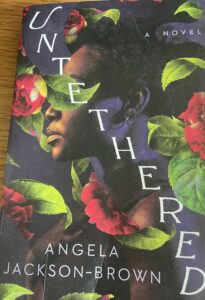Using Questions to Write a Novel
 My apologies for being late with this week’s post. I spent the weekend at a writer’s conference with my wife Cathy. I’d taught at this conference the past two years, but this time Cathy was a participant, and I was just along for the ride. I thought I’d take some notes about a new novel I want to write and maybe even flesh out a scene or two, but what I ended up doing was reading a good deal of Angela Jackson-Brown’s novel, Untethered. As I read, I was reminded of an important lesson about novel writing. Sometimes writing a novel is a matter of posing a series of significant questions.
My apologies for being late with this week’s post. I spent the weekend at a writer’s conference with my wife Cathy. I’d taught at this conference the past two years, but this time Cathy was a participant, and I was just along for the ride. I thought I’d take some notes about a new novel I want to write and maybe even flesh out a scene or two, but what I ended up doing was reading a good deal of Angela Jackson-Brown’s novel, Untethered. As I read, I was reminded of an important lesson about novel writing. Sometimes writing a novel is a matter of posing a series of significant questions.
Untethered opens during a problematic situation. Our narrator, Katia, the executive director of the Pike County Group Home for Negro Boys, is concerned about one of her residents, Chad. It appears that the court will return him to his mother even though she’s an addict and has a boyfriend who’s abused Chad in the past. Question number one: What’s going to happen to Chad?
The next troubling situation involves Katia’s twin brothers, Marcus and Aaron, who are missing in action in Vietnam. Question number two: What’s going to happen to the brothers?
Jackson-Brown keeps adding complications. Katia is in a relationship with a man, Leon, whom she considers more of a brother than she does a lover. To complicate that even further, a former high school peer, Seth, appears and becomes a steadying presence in Katia’s life. She feels attracted to him but does her best to keep him at arm’s length since she can’t have a baby, and she feels sure that’s what Seth will want if they ever manage to marry. Question number 3: What’s going to happen with Katia and Leon and Seth?
Untethered opens with these unanswered questions, thereby offering up a structure that depends on the dramatization of each narrative strand. Jackson-Brown does a spectacular job of setting everything in motion by utilizing the strategy of placing characters in unstable situations. We read with interest because we want to know what the resolution will be for each narrative thread the novel includes. Following these threads gives the novel its excellent narrative momentum.
I wanted to share this description of Untethered with you to invite you to think about how to open a novel in an effective way. Give the characters significant situations that demand their attention, complicate each strand (doing so will also complicate your characters in interesting ways), dramatize each strand and delay its resolution until the last third of your book. Let each strand vibrate against the others, so each becomes necessary to the novel’s landing place.